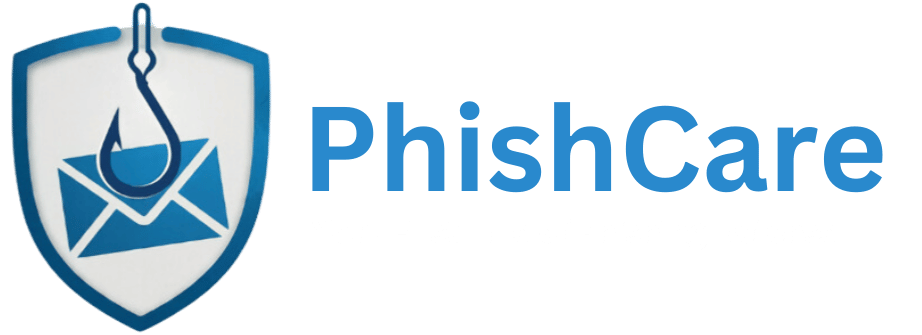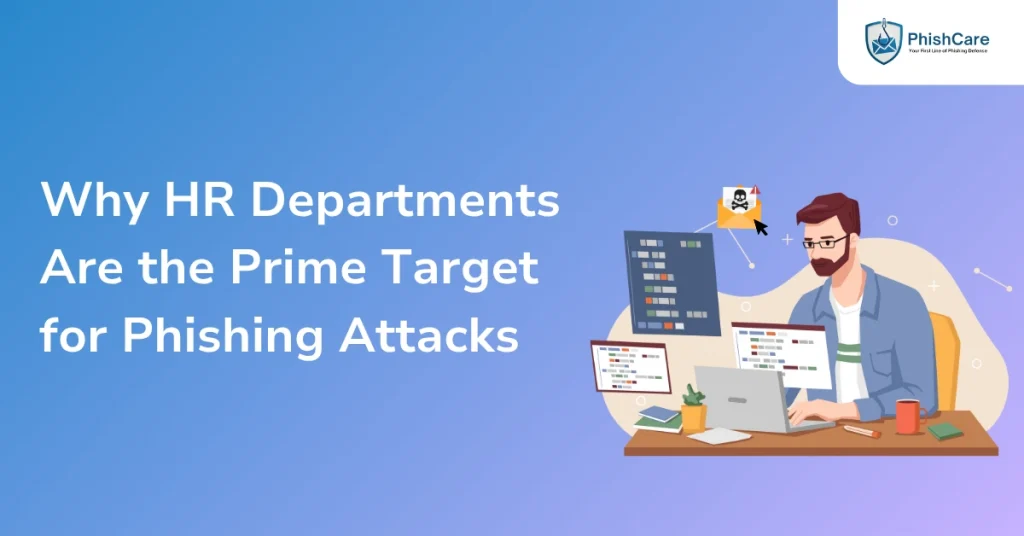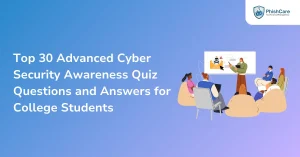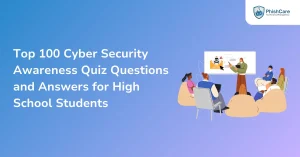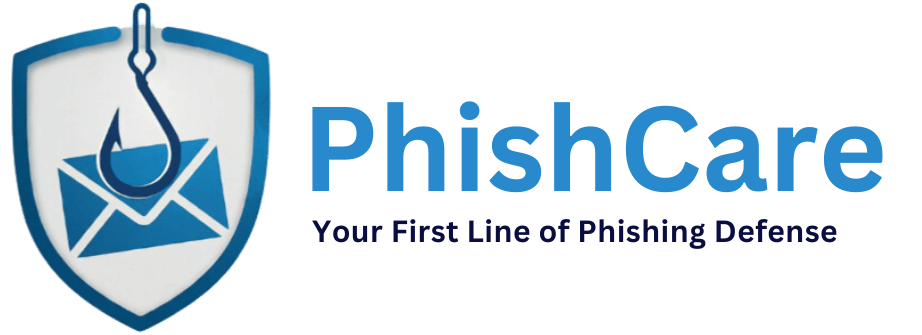Phishing has evolved into one of the most dangerous forms of social engineering, and HR departments often find themselves at the center of these attacks. From handling employee onboarding to processing payroll data and managing resumes, HR teams have access to vast amounts of sensitive personal and financial information, making them an irresistible target for cybercriminals.
A single phishing scam email disguised as a job application or internal HR notice can compromise entire systems. Attackers rely on faker emails, phishy emails, and even vishing (voice phishing) to deceive HR personnel into clicking malicious links, sharing credentials, or downloading infected attachments.
That is why CyberSapiens developed PhishCare, a cutting-edge phishing simulation tool that empowers organizations to strengthen their defenses. Through simulated phishing campaigns and comprehensive phishing simulation services, PhishCare helps organizations evaluate employee responses, identify weaknesses, and deliver targeted anti-phishing training for employees.
Why HR Is an Attractive Target for Phishers
1. HR Handles Sensitive Personal Information
HR teams manage data such as employee addresses, bank details, tax documents, and identification numbers. This treasure trove of personal information can be exploited for identity theft or financial fraud.
A phishing simulation service allows organizations to test whether HR professionals can detect and report phishy emails designed to mimic job applications or vendor messages. These phishing attack simulations replicate real-world scenarios, preparing HR staff to recognize and avoid threats before real damage occurs.
2. High Volume of External Emails
HR departments receive hundreds of emails daily, from job applicants, recruitment agencies, and internal employees. This constant influx of messages makes it easy for phishing scam emails to blend in.
Using an email phishing test from a managed phishing simulation service like PhishCare helps identify how likely HR employees are to open suspicious attachments or click harmful links. The data from these tests can then inform more targeted phishing prevention training for the team.
3. Phishing Emails That Masquerade as Job Applications
Attackers often attach remote access trojans or viruses within resumes or offer letters. When HR staff download these files, they unknowingly execute malicious code, allowing hackers to infiltrate systems.
With a phishing simulation tool, HR teams can safely experience these types of attacks in a controlled environment. By analyzing results through phishing simulation reports, organizations can see how their employees react and adjust their cyber security awareness training accordingly.
4. Payroll and Benefits Fraud
Cybercriminals frequently target HR departments to manipulate payroll data. A fake email from an employee requesting to update their bank details can easily trick HR staff if they are not cautious.
Through phishing simulation services, HR teams can be trained to verify requests through secondary channels and spot subtle indicators of fraudulent messages. Continuous phishing training for organizations ensures such threats are recognized and reported.
5. HR’s Role in Corporate Communication
HR often sends company-wide announcements or onboarding emails. Hackers know that impersonating HR gives their messages credibility. This makes HR impersonation phishing one of the most effective tactics in an attacker’s toolkit.
A corporate phishing awareness program strengthens trust and verification processes. By deploying simulated phishing campaigns, companies can teach employees to double-check HR communications, especially those requesting login credentials or document downloads.
How Phishing Simulation Services Strengthen HR Security

1. Realistic Risk Assessments
A phishing risk assessment conducted through a phishing simulation service gives organizations measurable insights into HR vulnerabilities. Each cybersecurity phishing test records how quickly employees recognize or report a threat, helping companies refine their security and awareness training programs.
These assessments not only help protect sensitive employee data but also ensure compliance with data protection regulations like GDPR and ISO 27001.
2. Tailored Awareness Campaigns for HR
Since HR roles and responsibilities differ from other departments, their phishing resilience training should reflect those specific challenges. A phishing simulation tool like PhishCare allows customization of simulated phishing campaigns tailored to HR workflows, such as fake resumes, benefit updates, or onboarding requests. This customized approach ensures HR staff receive relevant employee phishing awareness training and learn to detect the most likely attack vectors in their daily operations.
3. Data-Driven Security Insights
Phishing simulation reports provide data-driven insights on who clicked, who reported, and who ignored suspicious emails. These analytics form the foundation for ongoing phishing prevention training and help organizations evaluate improvements in workplace phishing awareness.
A managed phishing simulation service like PhishCare compiles detailed metrics to help organizations track employee progress, making it easier to identify which individuals or departments require additional support.
4. Reinforcing Multi-Factor Authentication Practices
Even with multi factor authentication, phishing attacks remain a threat, especially if employees are tricked into revealing one-time passwords or approval codes. Cyber security awareness training ensures HR professionals understand why MFA alone is not foolproof and reinforces cautious behavior when handling login or verification prompts.
By combining phishing attack simulation exercises with ongoing education, organizations create multiple layers of defense that greatly reduce risk.
Why PhishCare is the Best Phishing Simulation Tool and Security Awareness Training for Hr Departments

- Customizable Templates
- Awareness Module
- Assessment Test
- Comprehensive Tracking
- Graphical Dashboard Access
- Campaign Report
- Custom Domain Integration
Why Regular Phishing Simulations Are Crucial for HR
Attackers constantly innovate, using QR code phishing, catfishing, and other creative tactics to trick employees. Regular phishing simulation services help organizations stay ahead by testing new threat vectors before hackers exploit them.
Each simulated phishing campaign not only trains employees but also provides measurable outcomes through detailed reporting. This data-driven feedback loop ensures continuous improvement in employee phishing awareness training and phishing prevention training.
The ongoing use of a phishing simulation tool like PhishCare keeps HR departments alert, engaged, and fully equipped to handle sophisticated phishing attempts.
How PhishCare Helps Protect HR from Phishing Attacks
PhishCare by is designed to help HR departments proactively defend against phishing threats through simulation, analysis, and awareness. Here’s how PhishCare helps your organization build resilience:
1. Simulate Real-World Phishing Scenarios
PhishCare creates realistic phishing simulations that mimic everyday HR communications — from job applications and onboarding emails to payroll updates. These controlled simulations test employees’ ability to recognize suspicious emails without risking actual data breaches.
2. Identify Vulnerable Users and Departments
Detailed phishing simulation reports help you pinpoint which individuals or teams are more susceptible to phishing emails. With this insight, organizations can focus their cybersecurity awareness training where it’s needed most.
3. Deliver Targeted Anti-Phishing Training
PhishCare provides tailored anti-phishing training for employees, especially HR teams who handle sensitive information daily. These bite-sized, interactive sessions teach staff how to detect, report, and respond to phishy emails effectively.
4. Measure and Improve Security Readiness
Every phishing attack simulation generates actionable metrics, such as click rates, reporting time, and improvement scores. These insights help organizations measure progress and reinforce a culture of cyber vigilance.
5. Maintain Compliance and Build Trust
With PhishCare, organizations can ensure compliance with standards like ISO 27001:2022 and GDPR while building a security-first HR culture. Regular simulations and awareness programs demonstrate due diligence and enhance overall data protection practices.
6. Continuous Learning Through Automated Campaigns
PhishCare automates phishing simulations throughout the year, ensuring employees stay updated as attackers evolve their tactics. This ongoing engagement helps HR teams remain alert and reduces long-term organizational risk.
PhishCare: Empowering HR to Stay Secure and Compliant
PhishCare is not just a phishing simulation tool, as it is a complete awareness and resilience platform. By conducting phishing attack simulations, organizations can identify vulnerabilities, reduce risks, and strengthen their HR team’s ability to respond effectively.
Through phishing simulation services, PhishCare delivers tailored anti-phishing training for employees, measurable reports, and data-backed phishing risk assessments. It helps HR teams build stronger defenses, meet compliance obligations, and foster a culture of workplace phishing awareness across the organization.
For any business serious about protecting its people and data, PhishCare’s managed phishing simulation service is an essential step toward long-term cybersecurity resilience.
FAQs: Why HR Departments Are the Prime Target for Phishing Attacks
1. Why are HR departments targeted in phishing attacks?
HR teams handle confidential employee information, payroll data, and recruitment communication, making them high-value targets for cybercriminals.
2. How can a phishing simulation service help HR?
A phishing simulation service exposes HR to realistic attack scenarios, helping them learn to detect and report phishy emails safely before real damage occurs.
3. What types of phishing attacks target HR?
Common tactics include fake job applications, payroll scams, and internal impersonation emails that exploit HR’s trusted communication channels.
4. How often should HR undergo phishing awareness training?
HR teams should participate in cyber security awareness training and email phishing tests at least every quarter to maintain awareness.
5. How does PhishCare support HR cybersecurity?
PhishCare by CyberSapiens offers a managed phishing simulation service that includes simulated phishing campaigns, phishing prevention training, and detailed reports to measure HR readiness and compliance.
